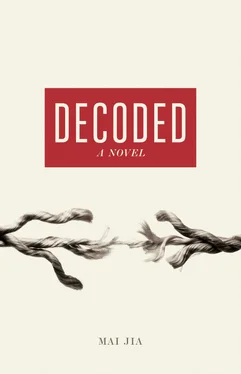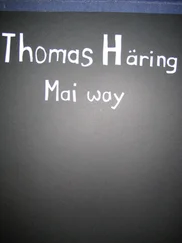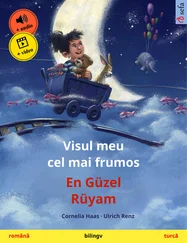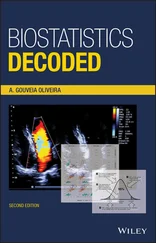Mai Jia - Decoded
Здесь есть возможность читать онлайн «Mai Jia - Decoded» весь текст электронной книги совершенно бесплатно (целиком полную версию без сокращений). В некоторых случаях можно слушать аудио, скачать через торрент в формате fb2 и присутствует краткое содержание. Год выпуска: 2014, Издательство: Allen Lane, Жанр: Современная проза, на английском языке. Описание произведения, (предисловие) а так же отзывы посетителей доступны на портале библиотеки ЛибКат.
- Название:Decoded
- Автор:
- Издательство:Allen Lane
- Жанр:
- Год:2014
- ISBN:нет данных
- Рейтинг книги:3 / 5. Голосов: 1
-
Избранное:Добавить в избранное
- Отзывы:
-
Ваша оценка:
- 60
- 1
- 2
- 3
- 4
- 5
Decoded: краткое содержание, описание и аннотация
Предлагаем к чтению аннотацию, описание, краткое содержание или предисловие (зависит от того, что написал сам автор книги «Decoded»). Если вы не нашли необходимую информацию о книге — напишите в комментариях, мы постараемся отыскать её.
Decoded — читать онлайн бесплатно полную книгу (весь текст) целиком
Ниже представлен текст книги, разбитый по страницам. Система сохранения места последней прочитанной страницы, позволяет с удобством читать онлайн бесплатно книгу «Decoded», без необходимости каждый раз заново искать на чём Вы остановились. Поставьте закладку, и сможете в любой момент перейти на страницу, на которой закончили чтение.
Интервал:
Закладка:
On previous occasions, any relief from constipation had been followed by a period of serious stomach inflammation. Thus his stoppage of the bowels would normally be followed by dreadful diarrhoea, as if he had to proceed through these two extremes to recover. This time, however, he seemed to have escaped from this vicious circle — his constipation relieved, he made a complete recovery without any other symptoms or problems. He now started to become seriously interested in the medicinal properties of pear-blossom water. What had begun as a pure accident now struck him as the inner workings of divine providence. From this time onwards, he would brew himself a cup of pear blossoms the way that other people make themselves a cup of tea — the more he drank the more he enjoyed it. Every year when the pear trees flowered, he would feel an incomparable joy and sense of satisfaction. Picking these fragrant and delicate blossoms, he would feel as if he were slowly recovering his long-lost health. Under the stress of long-term pain, he had dreamed every night of the pear flowers bursting open in the sunlight, floating through the wind and the rain. It was a sign that he hoped that God would let him die, would let him leave with the pear blossoms.
Early one morning, the old man called Duckling to his bedside and gestured that he wanted a piece of paper and a pen. He wrote down the following message: ‘When I am dead, I want you to put pear flowers in my coffin.’ That evening, he called Duckling back to his bedside and again demanded paper and pen, so that he could give more detailed instructions: ‘I am eighty-nine years old and I would like eighty-nine pear flowers to be buried with me.’ The next morning, he called Duckling to his bedside again and once supplied with paper and pen, he made his wishes even more precise: ‘Work out how many days there are in eighty-nine years and then bury me with that number of pear flowers.’ Perhaps the old man was confused and fearful in the face of his oncoming death, for at the moment that he wrote these increasingly complex instructions, he seemed to forget completely that he had never taught Duckling any mathematics.
Although he had never formally been taught any mathematics, Duckling was quite capable of this kind of simple addition. It is part of life, everyday stuff: a moderately intelligent child, even if you don’t formally teach them this kind of skill, will still be able to manage it. If you look at it from that point of view, then Duckling had already received as much instruction in addition and subtraction as he needed, since every year when the pear blossoms began to fall from the trees, Mr Auslander would collect them and afterwards get Duckling to count them. When he had come up with the correct number, it would be noted on the wall. Later on, Mr Auslander might well get him to count them again and the total was written up a second time on the wall. That way, by the time that the flowers had all fallen, Duckling’s addition and subtraction had had a thorough work-out, not to mention his understanding of numbers and decimal places. However, that was all that he had learned. Now he was going to have to rely on this strictly limited experience to calculate how many days his daddy had been alive, based on the information that old Mr Auslander had prepared for his tombstone, including the time and place of his birth. Because he had such limited mathematical experience, the calculation took ages — it was a whole day before he got a result. Dusk was falling when Duckling walked up to the bed and showed the result of his lengthy calculation to his daddy, who by that time no longer even had the strength to nod his head. He touched the boy’s hand gently and then closed his eyes for the last time. It was for this reason that Duckling had no idea whether the answer he had obtained was right or not. When he realized that Young Lillie was looking at his workings out, for the very first time he began to understand that this relationship might be very important to him, so he began to feel nervous and uncomfortable.
Duckling had used three sheets of paper for working out his calculations. Even though they were not numbered, when Young Lillie looked at the uppermost page, he realized immediately that it was also the first page. The first page began like this:
One year: 365 days.
Two years: 365 + 365 = 730 days.
Three years: 730 + 365 = 1,095 days.
Four years: 1,095 + 365 = 1,460 days.
Five years: 1,490 + 365 = 1,825 days.
Having got this far, Young Lillie realized that Duckling didn’t know how to do multiplication. Since he did not know multiplication, he had no choice but to use this cumbersome method. Having added up year by year until he reached the total for eighty-nine years, he worked out the figure of 32, 485 days. From this figure he had deducted 253 days, leaving a final total of 32, 232 days.
Duckling asked, ‘Am I right?’
Young Lillie realized that Duckling was wrong, because of course not every year consists of 365 days. According to the solar calendar, every four years you have a leap year, which consists of 366 days. On the other hand he also realized that it cannot have been easy for a child of twelve to work through such a long and tiresome calculation without making any mistakes. He didn’t want to upset him, so he said that the answer was correct and praised him for all the trouble that he had gone to:
‘You are absolutely right about one thing. By basing your calculations on the number of days in a whole year, starting from the day of his birth, yosaved yourself a lot of trouble. If you think about it, if you had started your count on the first of January, it would have left you with two incomplete years at the beginning and end of Mr Auslander’s life to include in your final count, whereas this way you only have to think about the number of days that he lived passed his birthday. That really has saved you a lot of effort.’
‘But now I have worked out a much easier way of doing it,’ Duckling said.
‘How?’
‘I don’t know what it is called, but look at this.’
As he spoke, Duckling fished another couple of pages out from under his bed for the old man to look at.
These pieces of paper were of a completely different size and texture from the previous ones, and Duckling’s handwriting was also somewhat altered, indicating that it must have been written at some other time. Duckling said that he wrote it after Daddy’s funeral. Young Lillie looked at it and realized that the left-hand column contained addition as before, while the right-hand column contained the method of calculation that he did not know the name for:
One year: 365 days. 356.1 = 365. Two years: 365 + 365 = 730 days. 365.2 = 730. Three years: 730 + 365 = 1,095 days 365.3 =1,095.
As I am sure you will have realized, Duckling was using a dot to indicate multiplication — he did not know the proper sign and hence had to invent one of his own. Using this dual method of calculation, he had worked out a total for the first twenty years. But from the twenty-first year, he swapped the order of the two methods, giving his dot multiplication first and the addition second:
Twenty-one years: 365.21 = 7,665 days.
7,300 + 365 = 7,665 days.
At this stage, Young Lillie noticed that the figure of 7,665 obtained by multiplication had been corrected; the original answer had been something like 6,565. After that the total for every year was worked out the same way. The dot method came first and the addition came second, furthermore the result obtained by multiplication sometimes showed signs of having been corrected, to fit with the figure obtained by addition. However, the figure obtained by multiplication for the first twenty years of old Mr Auslander’s life did not seem to have been corrected. That meant two things:
Читать дальшеИнтервал:
Закладка:
Похожие книги на «Decoded»
Представляем Вашему вниманию похожие книги на «Decoded» списком для выбора. Мы отобрали схожую по названию и смыслу литературу в надежде предоставить читателям больше вариантов отыскать новые, интересные, ещё непрочитанные произведения.
Обсуждение, отзывы о книге «Decoded» и просто собственные мнения читателей. Оставьте ваши комментарии, напишите, что Вы думаете о произведении, его смысле или главных героях. Укажите что конкретно понравилось, а что нет, и почему Вы так считаете.












